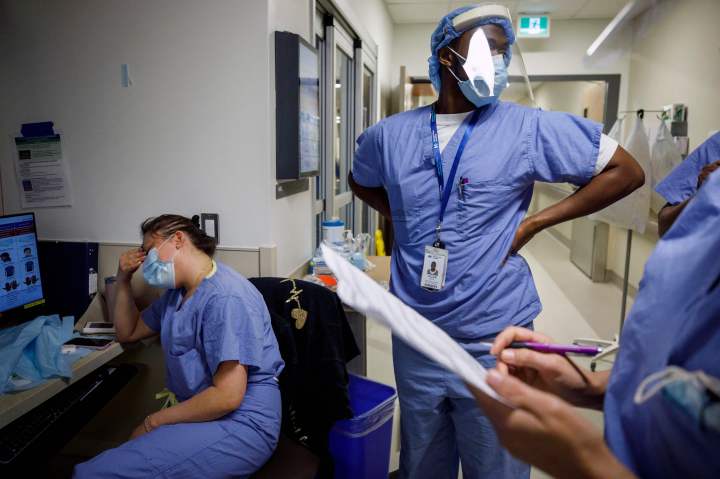
What do nurses have to say about the nursing shortage?
What do nurses have to say about the nursing shortage?

The shortage of nurses in hospitals and other healthcare facilities is affecting care across the country. Providers have tried plugging the gaps by, among other measures, hiring more travel nurses, bringing in outside personnel to work with existing staff.
According to Deborah Burger, the president of National Nurses United, the largest nursing union in the country, the shortage is a product of healthcare employers who haven’t been providing adequate supplies or staffing support. Another problem, Burger said, is the prospect of nurses losing their licenses in the event of a mistake, which happened in March when a former nurse was convicted of criminal negligence over a patient’s death.
“There are enough licensed nurses in this country to be able to provide that care. There are, however, a shortage of nurses willing to step up to the plate and put their license at risk during this time,” Burger told Marketplace’s David Brancaccio.
The following is an edited transcript of their conversation.
David Brancaccio: Is this a good time or a bad time to be a nurse? I mean, if there’s a shortage, it might put nurses in a stronger bargaining position. But it can also mean too much work for the nurses we have.
Deborah Burger: This is a good time to be a nurse, even though there is the pandemic, we have a lot of leverage to make sure that our patients get the care that they need. There really is not a staffing shortage per se. What we’re concerned about is that there’s a shortage of nurses willing to put their lives and their license and patients’ lives at risk, because of the conditions that our employers are providing for us to work under.
Brancaccio: So this is, in part, an important discussion about the conditions under which nurses will work. It isn’t necessarily a salary discussion.
Burger: Exactly. When we’re in negotiations, generally speaking, the wages that we need are the last thing that we deal with. We are primarily concerned about staffing and the ability to keep our licenses because nurses are accountable for the care they provide. But they don’t have the authority to dictate the conditions in which they provide that care. And management has the authority to dictate conditions, but it faces little accountability for staffing, supplies, closing units, closing facilities — mostly out of profitability concerns.
Brancaccio: I mean, I’m aware, and have followed a famous if not notorious case, I think out of Tennessee, where a nurse made a mistake and is being held criminally liable. But you’re saying that in more routine matters, a nurse’s license to practice nursing could be at stake because of management decisions that their employer makes.
Burger: That is exactly what I’m saying. And it is a concern for nurses, even more than wages, as a priority. So once you lose your license, you lose your ability to provide a stable income for your family, and you can’t be a nurse ever again. So it is a primary concern for us, which is why in California, we have safe staffing ratios, and we are trying to achieve that nationally.
Brancaccio: And so in negotiations with health care providers, this is a key issue, you’re saying?
Burger: Staffing is a huge key issue for nurses because that does affect our ability to provide care in a safe manner and to be able to assess the patient’s changing conditions in the hospital, which can affect the outcome of a patient in the hospital.
Brancaccio: Still, nurses tend to be predominantly female, do you think that plays in the compensation that nurses have been able to secure for themselves, that somehow this is still a gendered issue and there may be some kind of gender discrimination in the calculation of how much to pay a nurse?
Burger: Care work in this country really isn’t valued when you’re looking at what nurses and other health care workers provide. And because it has, is a female-dominated profession, it does have gendered implications in how the work we do is valued.
Brancaccio: What about this notion of a nursing shortage? I keep seeing headlines and meetings to discuss the problem with, you know, among other things, baby boomer-age nurses retiring and people burnt out from getting through peak, after peak, after peak of COVID.
Burger: Well, the nursing shortage is really a manufactured shortage on the part of employers. We’ve had a shortage of nurses before the pandemic. We’ve had a shortage of nurses during the pandemic. And part of it was nurses were leaving nursing in order to protect their health, the health of their families, because they weren’t given the proper personal protective equipment, the proper staffing. There are enough licensed nurses in this country to be able to provide that care. There are, however, a shortage of nurses willing to step up to the plate and put their license at risk during this time.
Brancaccio: Give me your thoughts about travel nurses, where a person goes to a new place and is brought in on contract for a while, amid what some were calling the shortage. The idea is that travel nurses can ask for — and get — premium pay. But if that pay is more than staff nurses’, it’s going to create tensions. What’s your sense of this?
Burger: Well, staff nurses really appreciate the help of traveller nurses. But they’re a short-term solution to the hospital executives’ problems. It doesn’t solve the staffing shortage. What you need to do is hire more staff nurses at the facility. What you have to do is make sure that the executives are actually evaluating what they’re contributing to this staffing crisis.
Brancaccio: You’re saying that consciousness is not being raised among the people who make the management decisions at the hospitals, in your view?
Burger: Despite the fact that nurses, all along, have said what will keep them happy, and what will keep them productive, and what will keep them at a facility, is true appreciation for the work they do by supplying an environment where they can safely practice nursing, without harming patients, without causing a nurse to lose their license and [making] sure during this pandemic that they don’t get sick by having adequate PPE. And during this entire pandemic, that has not been the case.
Brancaccio: Even now, two years plus into this whole thing, there’s not enough masks and gloves and garb?
Burger: Right now, there is an adequate supply of PPE. However, it is still being locked up in managers’ offices. All of those supplies are under lock and key. And it has delayed care and it has caused unnecessary nurse and patient suffering and illness. And there is a lack of transparency of how many supplies are actually available.
Brancaccio: What do you think, from their perspective? In the name of keeping costs down, or something?
Burger: Absolutely for keeping costs down. We have [seen], through this entire pandemic and even before the pandemic, hospital executives have adopted the auto industry and the manufacturing industry model of just-in-time supplies. And it has failed miserably during this pandemic. Both in other manufacturing arenas, but especially in healthcare, because they relied on being able to have quick access to supplies and that broke down during the pandemic.
There’s a lot happening in the world. Through it all, Marketplace is here for you.
You rely on Marketplace to break down the world’s events and tell you how it affects you in a fact-based, approachable way. We rely on your financial support to keep making that possible.
Your donation today powers the independent journalism that you rely on. For just $5/month, you can help sustain Marketplace so we can keep reporting on the things that matter to you.


















